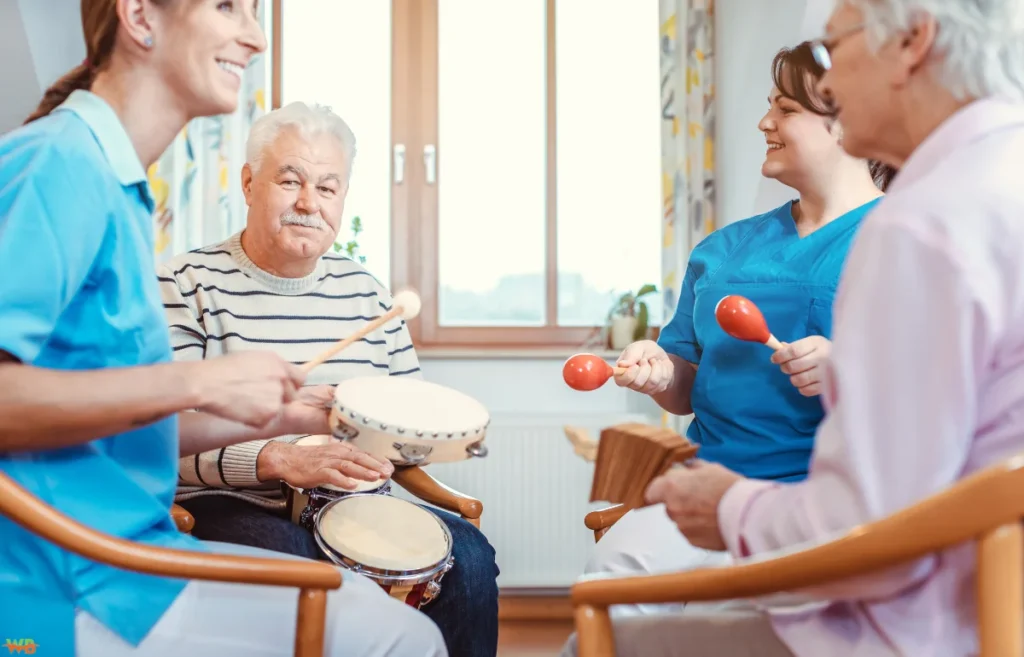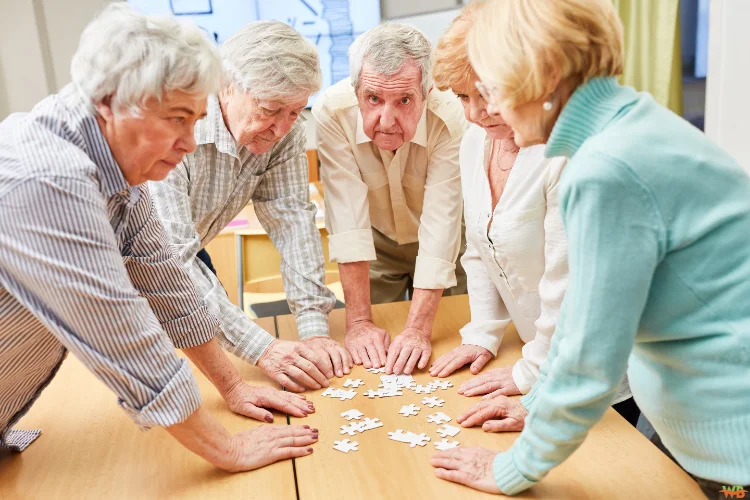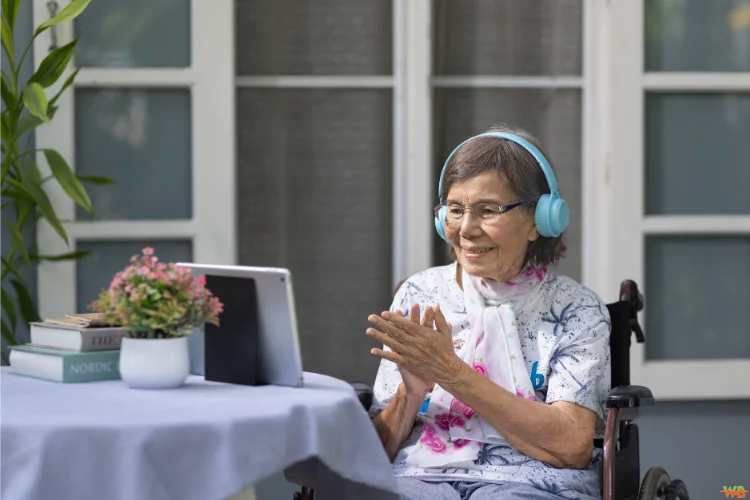As a veteran aged care facilitator with experience working at a large 108-bed aged care facility for over 10 years, I noticed how important music therapy is when it comes to the well-being of my senior residents. In fact, in our seniors’ daily routines and interactions, music therapy really stood out as the most impactful activity that we offer. Music therapy and its ability to tap the residents on an emotional and cognitive level is indeed amazing.
The Importance of Music Therapy in Aged Care
Based on my observations, music therapy has been a remarkable tool for many of our aged care residents. More than just mere entertainment, music therapy fosters emotional connections, triggers memories, and provides a sense of comfort and belonging. I have witnessed firsthand how a familiar tune can bring a smile to a resident’s face, transport them back to a moment of their lives, and even encourage socialization. Whether in a traditional aged care setting or a continuing care retirement community, music therapy plays a vital role in enhancing residents’ emotional and cognitive well-being.
Music Therapy for Alzheimer’s and Dementia
The effects of music therapy on dementia and Alzheimer’s patients are among the most significant. Music can reach parts of the brain that other therapies cannot, helping to unlock areas such as memories and emotions.
I recall a resident who rarely spoke due to advanced dementia. However, when we played a song from her youth, she began to sing along, her face lighting up with recognition and joy. Such moments underscore the powerful role of music therapy for dementia.
Benefits for Seniors with Limited Vision
Music offers a sensory experience that can be both soothing and stimulating for our aged care residents will limited vision. Music provides an opportunity for residents to engage with their environment in a meaningful way. In our aged care facility, music therapy sessions often become a highlight of their week, offering a break from the isolation that vision impairment can bring. The benefits of music for these seniors are beyond measure!
Engaging Activities for Seniors
In addition to music therapy, we also incorporate various quizzes and interactive activities that stimulate the mind, the body, and the mental state of our residents. In addition to being entertaining, these activities encourage social connection and cognitive engagement.
Fun Quizzes for Seniors
One of the most successful activities we’ve introduced is our music-themed quizzes. By playing music samples during the quizzes, we can spark memories and evoke emotions that deeply resonate with our residents. These quizzes become lively, interactive sessions where residents reminisce and share stories sparked by the music.
One particular favorite is the Old Time Dance Quiz. This quiz features classic dance tunes that many of our residents remember from their youth. The joy and nostalgia these songs evoke are palpable, creating a vibrant and engaging atmosphere.
Expanding the Reach of Music Therapy in Aged Care
In addition to its emotional and cognitive benefits, music therapy can play a critical role in reducing stress and anxiety among elderly residents. The soothing qualities of music help regulate heart rates and lower blood pressure, creating a calming environment. For residents who experience agitation or restlessness, it offers a non-invasive alternative to medication.
The rhythm and melody have the power to settle emotions, providing relief from daily discomforts. By carefully selecting music that resonates with each individual, caregivers can tailor sessions to meet the unique needs of residents, enhancing their sense of peace and relaxation.
Music Therapy for Socialization and Community Building
Music therapy also fosters a sense of community and strengthens social bonds among aged care residents. Group music sessions encourage collaboration and interaction, allowing residents to share their love of music and connect with others in meaningful ways. For those who may be isolated or withdrawn, participating in these group activities provides an opportunity to form friendships and engage with their peers.
Singing, clapping, or even simply listening together helps reduce feelings of loneliness, promoting a positive group dynamic. Through shared experiences, it becomes a bridge for emotional connection, allowing residents to feel supported and valued.
The Role of Music in Memory Activation
Another profound aspect of music therapy is its ability to activate long-term memories, particularly in those with dementia and Alzheimer’s disease. Familiar songs from a resident’s past can evoke vivid memories of their youth, family, and significant life events. This process not only aids in cognitive function but also helps restore a sense of identity and continuity. For individuals who struggle to recall personal details, music acts as a catalyst for recognition.
This re-engagement with their personal history often sparks conversations, emotional expression, and a deeper understanding of who they are, further improving their mental and emotional well-being. Music has the unique ability to bypass cognitive decline, creating moments of clarity and connection, allowing residents to relive cherished memories and experiences that otherwise may be lost.
Integrating Music Therapy with Other Therapeutic Practices
While music therapy stands out as a powerful tool, its benefits are even more profound when combined with other therapeutic practices. Integrating with physical, occupational, and speech therapy can create a holistic approach to aged care. For example, rhythm-based activities can help improve motor skills and coordination, while speech therapy combined with music can assist in enhancing verbal expression.
The combination of music with these therapeutic modalities provides a well-rounded approach that supports both the physical and mental health of elderly residents. This integration creates a multi-sensory experience that can be both fun and healing, enhancing the overall care program.
My Final Thoughts
Reflecting on my decade of experience in aged care, I can confidently say that music therapy has been a cornerstone of our care programs. It enriches the lives of our residents, particularly those with Alzheimer’s, dementia, and limited vision. The joy and comfort it brings are unparalleled.
Incorporating music therapy and interactive activities like quizzes can significantly enhance the well-being and quality of life for seniors. For any aged care professional, I wholeheartedly recommend embracing these powerful tools. They not only brighten the days of our residents but also create moments of bliss and stress relief.
For those interested in exploring more about these beneficial activities, I encourage you to consider how music therapy can transform the care experience.

I’m Salman Khayam, founder of Wellbeing Junction. I synthesize trusted information from research and expert guidance to create clear articles across health, wellness, and lifestyle topics.
Disclaimer: Content is for informational purposes only and is not medical advice. Consult a qualified expert regarding personal health or specialized questions.
Discover more from Wellbeing Junction
Subscribe to get the latest posts sent to your email.




